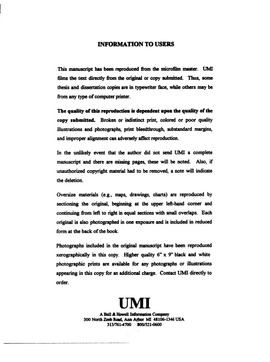| dc.contributor.advisor | Friedrich, Gustav, | en_US |
| dc.contributor.author | Kobayashi, Emiko. | en_US |
| dc.date.accessioned | 2013-08-16T12:29:53Z | |
| dc.date.available | 2013-08-16T12:29:53Z | |
| dc.date.issued | 1997 | en_US |
| dc.identifier.uri | https://hdl.handle.net/11244/5558 | |
| dc.description.abstract | In the research reported here, comparable measures are created of the perceived threats of shame, embarrassment, and management sanctions for three categories of occupational deviant conduct (taking a long lunch or break without approval, coming to work late or leaving early without approval, and using sick leave when not really sick). The effects of three punishment threats on people's intention to violate three organizational rules are then examined in merged samples of employees in Japanese and U.S. university hospitals. Compared to American employees, Japanese employees perceive greater threats of shame, embarrassment, and management sanctions and, subsequently, are less likely to commit each of the three offenses. The lower likelihood of Japanese employees to take a long lunch or break without approval or use sick leave when not really sick is primarily attributable to their greater threat of shame. Despite their lower intention to commit the future offenses, the analyses indicate that all three sanction threats have less of a deterrent impact for Japanese employees than for American employees, and these findings for interaction effects are not consistent with the predictions of the current research. | en_US |
| dc.description.abstract | Extending the concept of deterrence, emphasized in the rational choice decision-making theory of crime, to an organizational context, the present research examines empirically cultural differences in the perceived levels of punishment threats of shame, embarrassment, and management sanctions, and, subsequently, the prevalence of noncompliant workplace behaviors in Japanese and U.S. university hospitals. Secondarily, the present study assesses the interaction effects for cultural difference (Japanese and American) and the three sanction threats on noncompliance. | en_US |
| dc.format.extent | xiii, 176 leaves ; | en_US |
| dc.subject | Social control Cross-cultural studies. | en_US |
| dc.subject | Psychology, Social. | en_US |
| dc.subject | Employees Japan Attitudes. | en_US |
| dc.subject | Employees United States Attitudes. | en_US |
| dc.subject | Health Sciences, Health Care Management. | en_US |
| dc.subject | Labor discipline Cross-cultural studies. | en_US |
| dc.subject | Compliance Cross-cultural studies. | en_US |
| dc.subject | Sociology, Industrial and Labor Relations. | en_US |
| dc.title | A cross-cultural study of noncompliant behaviors in Japanese and United States hospitals: Noncompliance as a response to perceived threats of shame, embarrassment, and management sanctions. | en_US |
| dc.type | Thesis | en_US |
| dc.thesis.degree | Ph.D. | en_US |
| dc.thesis.degreeDiscipline | Department of Communication | en_US |
| dc.note | Adviser: Gustav Friedrich. | en_US |
| dc.note | Source: Dissertation Abstracts International, Volume: 58-09, Section: B, page: 5193. | en_US |
| ou.identifier | (UMI)AAI9810315 | en_US |
| ou.group | College of Arts and Sciences::Department of Communication | |
